Opinions Vary: One Man’s Cabin is Another Man’s High School
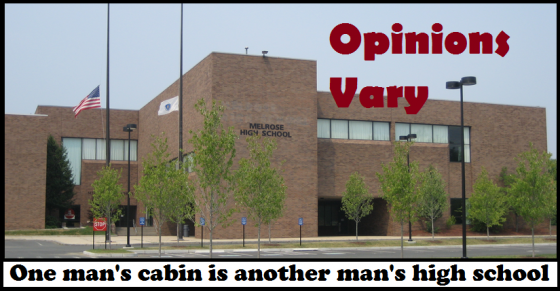
I recently rewatched one of my favorite movies. Then I realized that this particular movie was so similar to another movie, that one could basically be a remake of the other. Lets investigate shall we? We have a group of five young people, all selected for a purpose, and guided by some authority or agency that they cannot fight against to participate in a ritual that, given a conscious choice, they would not take part in. It is only through subtle manipulation of their every action that they inevitable cause the destruction of the world. The movie I am describing is of course the classic 80’s hit, The Breakfast club. The remake? Cabin in the Woods. Hit the jump and follow me down the rabbit hole.
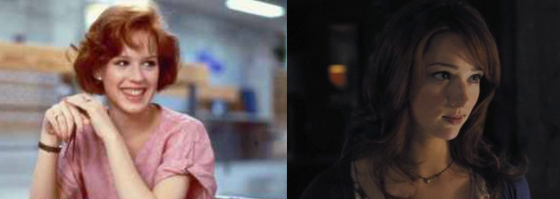
Both movies have a redheaded “virgin”. This character is meant to appeal to our vision of purity. While both movies are made up of an ensemble cast, this character is best positioned to be the protagonist. Throughout the course of the movie, these two characters are the ones who change the most. Whether its standing up to your bitchy friends and kissing the school degenerate, or fighting off a family of killer redneck torture zombies and causing the end of the world because you are disenfranchised with how humanity’s deal with the devil is working out, these two most effect the world around them. In the Breakfast club, perhaps Claire’s willingness to date someone like Bender will inspire others to overlook their first impressions of people and find deeper connections that result in meaningful, lasting relationships. In Cabin in the Woods, Dana’s refusal to execute Marty in the bloodiest manner possible is a statement to the rest of the world, for the few seconds that it has left, that says she doesn’t care if you think she brought about the end of all things. Its our relationships that give us place in the established social order. With Claire and Dana, the dilemma is the same. It doesn’t matter if the choice is to date the dangerous bad boy or to cause the apocalypse and bring down humanity. Its all about how they deal with other people’s perception of themselves and the choices they make.

Then we have the jock. The jock has an important role in both films. While the jock is used to meeting any physical challenge that is put in his path, in both films his problems arise because of their failures to realizes that not everything can be overcome this way. Theirs is a struggle of a different kind. In the Breakfast Club, Andy thinks the outside pressures on him are ruining the last few years he has of adolescence and making him into a person he doesn’t want to be. He knows that there will be a time to be a responsible adult, but right now, he wants to be a kid. Curt’s dilemma in Cabin in the Woods is similar; it’s a crisis of identity. Curt is presented as both an athlete and an honors student. However outside forces (in the form of toxic gasses) put pressure on him to act in a way that normally, he would not act. So be it parents and coaches who think they know the best course of actions to direct your life, or psychotropic drugs released in your vicinity that cause you to act in a manner that is contrary to your instincts, its all the same. The messages with these two characters is similar, don’t be afraid to be yourself in the face of overwhelming pressure to be something you’re not.
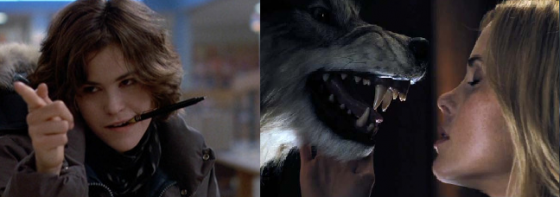
Next we come to the whore. Now, I am aware that in Breakfast club, Allison says that she is a virgin, however, that is right after she gives this speech …
ALLISON
I'll do anything sexual, I don't
need a million dollars to do it
either...
CLAIRE
You're lying...
ALLISON
I already have...I've done just
about everything there is except a
few things that are illegal...I'm a
nymphomaniac!
Later she recants the statement that she is a nymphomaniac in favor of being a compulsive liar. However, that still fits the bill as far as these characters are concerned. They are not who they seem to be and you should be wary around them. Cabin in the Woods starts off with Jules dying her hair blond. Right there that is a secret nod to Allison in the Breakfast club. “I’m lying about the color of my hair.” This is an effortless lie that requires no forethought, only the perception of others. Allison lies in a similar manner to the rest of her group. Her mere presence suggests that she committed some minor transgression to earn a Saturday detention. However, she did not. She just went there because she had nothing better to do. Her lie, just like Jules’ hair color, is one of false perception. They allow others to believe these lies about themselves because they want a reaction from other people. These two characters even share a similar arc. In Cabin in the Woods, Marty ponders why Jules is acting in such a manner, contrary to her normal, reserved personality. In The Breakfast Club, Allison is given a makeover, and dressed in clothes and make-up she would not normally wear. Whiles Jules’ death is one of her body, Allison’s death is one of her past.
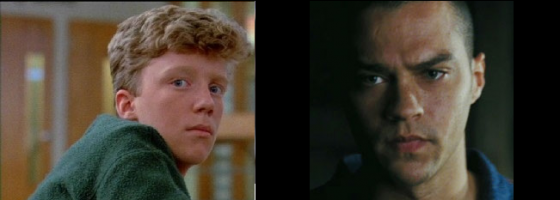
Now we move onto the brain. These two characters ironically fit together because they don’t fit with anyone else. Don’t worry, I’ll explain that. In Cabin in the Woods, we learn that Holden isn’t one of the gang. He’s brought along by Curt in hopes of linking him with Dana after she had a bad breakup. The important part there is that he’s not one of the group. He doesn’t really belong there. In the Breakfast Club, Brain is a straight A student who would sooner shit his pants than to put a wrong foot forward in the face of authority, yet there he is, in detention. Look at the rest of Brian’s crew; a spoiled princess, a troglodytic jock, a compulsive liar, and a stoner. Your mind can easily concoct why each of them could be in detention. They each, in their own way, belong there. Yet here we have honor student Brian. Why is he here? He, like Holden, doesn’t belong. Claire ditched school to go shopping, Andrew bullied a fellow student for a laugh, Bender pulled a fire alarm because he’s lashing out for attention, and Allison needed a way to kill a Saturday. Then we have Brian. He brought a flare gun into school to kill himself because he got a bad grade. Each of the other’s reasons for being there are selfish, yet Brian’s deed was more self-destructive. Like Holden, he doesn’t fit the pattern of why they are present for each of their stories.
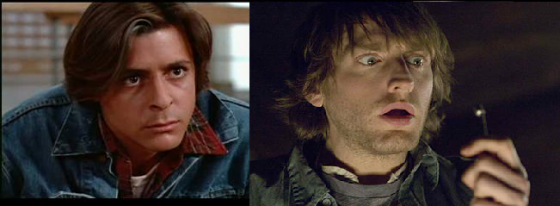
Bringing up the rear we have the burn out stoner who magically sees through all the bullshit in his surroundings and is the catalyst for bringing down the established order. The fact that you can’t tell if I am talking about Marty or Bender means that I don’t even have to work for this one. However for due diligence, I will continue. Marty eventually thinks that the group has been lured to the Cabin under false pretenses. Be it a social experiment or a game show, he’s sure that nothing is as it seems. So he questions everything. We already know from his first scene in the movie that he questions authority in the real world, what with him driving around smoking a bong. So this can only mean that he’s something of a rebel, a freethinker who is unconcerned with how society perceives him. John Bender is similar in this nature. Bender, like Marty, has a different perspective than his particular group. Bender comes from an abusive home, so he had to grow up fast. Part of that accelerated growth means having to put your childhood away before its natural time, basically the opposite of a man-child. So what does one do when you are faced with the problems of being an adult, but stuck in the body and social role of a child? It would sure frustrate the hell out of me. Like Bender, I would rebel; I would question the established order of things. While Marty is a few years older than Bender, they both are cursed with the burden of knowledge. That knowledge is “the world is full of shit.” Marty’s world is full of shit because he’s been forced into a ritual that calls for his own death to sate the appetite of world destroying demons, and Bender’s world is full of shit because he’s falling through the cracks of a system that is just pushing him along to be someone else’s problem. Marty’s revelations that the Cabin is not what it appears to be is the lynchpin moment in the movie. The narrative changes completely and sends the world spinning on its heels until it is summarily destroyed. Bender is the catalyst for the Breakfast Clubs own world destruction. Because of his constant banter with his group, he sends a ripple effect through the different social classes of his high school, and could cause a social revolution that up ends the current social order.
But what about some of the other characters that appear on screen? Surly my only evidence isn’t just 5 young people with similar qualities who endure a shared experience. You’re right, it’s not. Both of these movies have two sides. The one about the kids and the one about the workers. Let’s delve a little deeper.
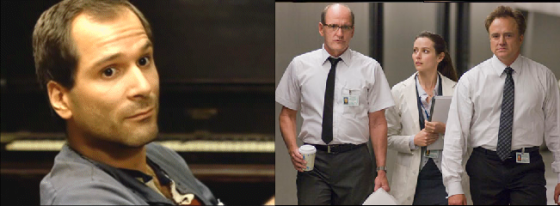
Whats the deal with the watchers in Cabin in the Woods? You know, those two guys who might as well be the eyes and ears of that particular institution … oh wait. Didn’t the janitor in the Breakfast Club give that exact speech? You know what, he did. I’m sure Carl is one bad day away from using chems and stims to direct the kids at John Hughes High to start acting out all sorts of wacky shit. After all, he listens to their conversations, he looks through their letters, and rummages through their lockers. He’s the last man in that building that you want to piss off. He even ends up extorting the Principle for a few bucks after catching him looking through private files. That’s gateway villainy. Speaking of villains …
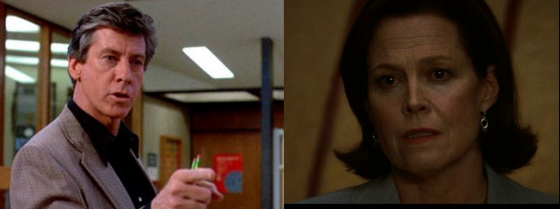
Principle Dick Vernon is much like the Director in Cabin in the Woods. These people have detestable jobs that can’t be easy to do, but by god they must be done. For an institution like a school to function, it needs a leader. Someone to be the directing voice to ensure everything goes smoothly. After all, a schools job is to educate the young to ensure that they can step into the real world and not fall apart at the first task required of them. If an entire nations school children were uneducated, that entire generation would be lost, setting back that country’s advancement, and perhaps even bring about its collapse. Seems a lot like the Director’s job at the facility in Cabin in the Woods. She is entrusted with ensuring the survival of an entire race by guiding her employees, and their targets through the necessary steps to complete their tasks. They both set the rules and hope that everything goes according to plan. Its not pretty, but its necessary.
But what about the off screen beings? There are unknown entities in both films that are the driving force behind the grand endeavors that occur in each movie. In Cabin in the Woods we are told that ancient beings that once controlled the Earth are placated by watching people who fit specific criteria are ritualistically harassed and killed (if that isn’t a metaphor for high school, I don’t know what is). The caveat for these subjects is free will. They must all choose the instrument of their destruction. Just as every member of the Breakfast Club made choices that brought them together. The Director does not kill random people on the side of the road to satisfy the ancient ones, nor does Principle Vernon terrorize random students. The analogue for the Ancient Ones is the student body. They expect and tolerate certain behavior from the various members of their tribes. Claire lays it out there when she asks about how they will treat each other on Monday. If Andy and Brian are suddenly buddies, it will reflect poorly on both of them from their respective tribes. Andy will be ridiculed by his jock friends and more than likely have to lie and say he’s using Brian to get his homework done. Brian’s friends would probably take umbrage at the idea of their friend suddenly befriending a jock who has no doubt harassed them in the past. They would most likely stop hanging around with Brian, leaving him even more isolated than before.
This brings us to the message of both movies, which is of course identical. Change isn’t always bad. Sometimes the established order isn’t the best way of doing things when you have to compromise your own self-identity to survive.



